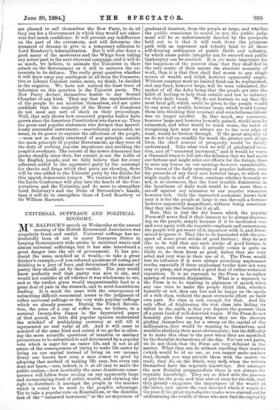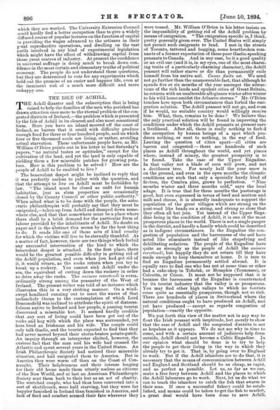UNIVERSAL SUFFRAGE' AND POLITICA T, ECONOMY.
MR. BALFOUR'S speech on Wednesday at the annual meeting of the British Economical Association was singularly frank and useful. Universal suffrage has un- doubtedly been of use in many European States in keeping Governments wide awake to universal wants and almost universal sufferings, but it has also introduced a great danger into the art of government. It has pro- duced the same mischief as it would,—to take a great thinker's example,—if you referred questions of eating and drinking to a jury of boys, and determined the amount of pastry they should eat by their verdict. The jury would know perfectly well that pastry was nice to eat, and would not consider at all whether it was wholesome to eat, and so the verdict given would unquestionably lead to a great deal of pain in the stomach, and to most innutritious feeding. It is much the same with the consequence of submitting difficult economical issues to the judgment of either universal suffrage or the very wide popular suffrage which we already possess. During the French Revolu- tion, the price of a cup of coffee rose, we believe, to a nominal twenty-five francs in the depreciated paper of that period, so little did popular opinion understand the mischief of multiplying currency at will till it represented no real value at all. And it will come to mischief of the same kind and extent if we go far in allow- ing the more scientific questions of taxation or sanitary precautions to be submitted to and determined by a popular vote which is eager for an easier life, and is not at all aware of the consequences of trying to make life easier by living on our capital instead of living on our income. Every one knows how soon a man comes to grief by adopting that method of making life easy, but every one does not know,—nor, indeed, is it at all easy to make the public realise,—how inevitably the same disastrous conse- quences will follow from seizing on any apparently large and accumulating fund of public wealth, and claiming the right to distribute it amongst the people in the manner which is voted to be most to the people's advantage. Try to take a popular vote on Bimetallism, or the distribu- tion of the "unearned increment," or the consequences of graduated taxation, from the people at large, and whether the public conscience be sound or not, the public judg- ment will be so unfortunately dazzled by the prospects held out to it that it will rush down the primrose path with an eagerness and velocity fatal to all those self-denying ordinances of public thrift and industry, by which alone public integrity can be secured and public bankruptcy can be avoided. It is far more important for the happiness of the poorest class that they shall feel to the very centre of their nature the absolute necessity of work, then it is that they shall find access to any single source of wealth and relief, however apparently ample. Without constant work no limited fund can be replenished, and any fund, however large, will be soon exhausted, the upshot of all the doles being that the people get into the habit of looking to help from outside and not to industry for their daily bread. We do not hesitate to say that the most fatal gift which could be given to the people would be any mine of wealth, however large, which would betray them into thinking that constant and even toilsome labour was no longer needful. In that mood, any resources, however large and however honestly gained, would soon be exhausted, and what would. be much worse, the habit of recognising how near we always are to the very edge of want, would be broken through. If the great majority of us do not toil on steadily for much the greater part of our lives, the chief sources of prosperity would be fatally undermined. Take what view we will of graduated taxa- tion, and of "unearned increment," and it would be worse a thousand times to fall into the delusion that we had made our fortune and might relax our efforts for the future, than to miss any bonus on our earnings however considerable. The excess of the daily earnings of popular industry, over the proceeds of any fixed sum however large, to which we might apply in aid of those earnings whether honestly or not, is so enormous, that the least sensible diminution in the heartiness of daily work would be far more than a set-off against any accession to our popular resources however rich. Only the instructed economist knows bow easy it is for the people at large to run through a fortune however apparently magnificent, without being conscious that they are the better for it at all.
Now, this is just the dry lesson which the popular Press will never find. it their interest to be always impress- ing on the people, simply because if it be inculcated over and over again with the requisite emphasis and earnestness, the people will get weary of it, impatient with it, and deter- mined to ignore it. They like to be fascinated with the pro- spect of some great stroke of good fortune ; they do not like to be told that any such stroke of good fortune is very rare, and even when it actually comes is quite as likely to do tbem harm as good, unless they are very sober and very wise in their use of it. The Press would lose its influence if it were always preaching unpleasant truths, especially if these unpleasant truths were not very easy to grasp, and required a good deal of rather technical exposition. It is no reproach to the Press to be rather sparing of economic disquisition. What is a reproach to the Press is to be wanting in plainness of speech when any one tries to make the people think that, whether honestly or not, they can live and be happy on the spoils of a rich class, without the most strenuous effort on their own part. No class is rich enough for that. And the only effect of frightening the rich class into hiding its talent in the earth, is that you deprive the poorest class of a great fund of well-deserved wages. If the Press do not honestly give this warning when they see the electors girding themselves up for a swoop on the capital of the millionaires, they would be wanting to themselves, and would be skulking their most obvious duty; but the difficulty is to make this clear to the poor when they are mystified by the Socialist declarations of the day. For our own parts, we do not think that the Press are very deficient in the matter. What they can do without repelling their readers (which would be of no use, as you cannot make readers read, though you may provide them with the matter to read), they do, on the whole, very well, when the writers themselves have the requisite knowledge. But amongst the new Socialist propagandists there is not always the requisite knowledge. They are so filled with the passion of pity for the poor, and that also of envy for the rich, that they grossly exaggerate the importance of the wealth of the latter, and ignore the vast mischief which it would do the poor if the great reproductive trades were starved out by undermining the wealth of those who now find the capital by which they are worked. The University Extension Council could hardly find a better occupation than to give a widely diffused course of popular lectures on the function of capital in providing the wages advanced to the artisans in their great reproductive operations, and dwelling on the vast perils involved in any kind of experimental legislation which might have the effect of withdrawing capital from those great centres of industry. At present the confidence in universal suffrage is doing much to break down con- fidence in the most certain and elementary truths of political economy. The people do not understand these questions, but they are determined to vote for any experiments which hold out the promise of an easier and happier life, even at the imminent risk of a much more difficult and more unhappy one.



















































 Previous page
Previous page